Introduction
Wondering how to parrot sleep soundly every night? Just like humans, parrots need proper rest to stay happy and healthy. Lack of sleep can lead to stress, mood changes, and health issues in your feathered friend.
In this guide, we’ll explore how to parrot sleep better by understanding their needs, creating the right environment, and setting a soothing bedtime routine. Follow these expert tips to ensure your parrot enjoys peaceful, restful nights.
Understanding Your Parrot’s Sleep Needs
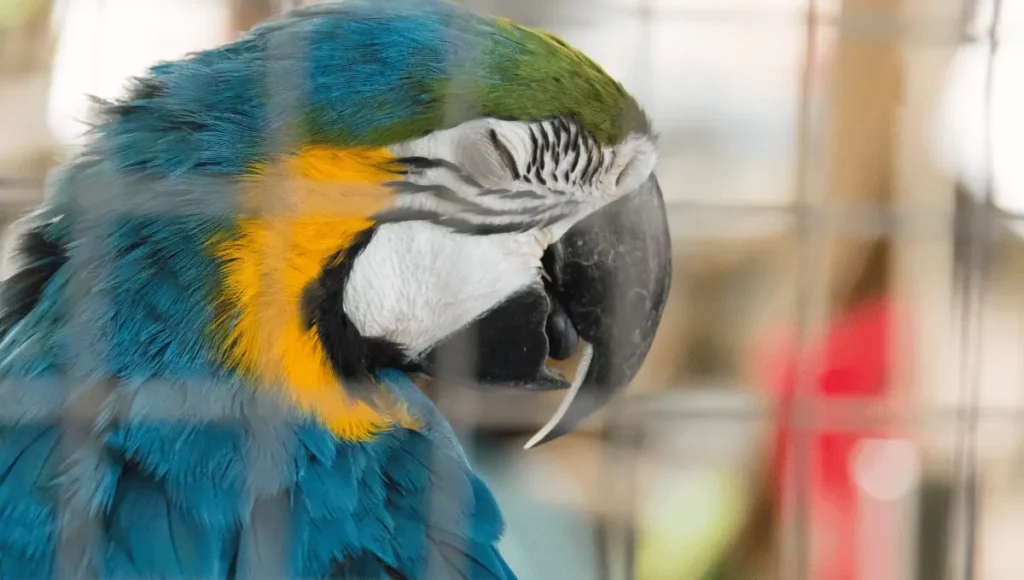
Why Sleep is Vital for Parrots
Sleep plays a crucial role in a parrot’s overall health and well-being. Just like humans, parrots need adequate rest to recharge their energy, support their immune system, and maintain balanced behavior. Without enough sleep, parrots can become irritable, stressed, and even prone to illness.
Parrots in the wild follow natural light cycles, waking at sunrise and resting after sunset. Mimicking this natural rhythm in captivity is essential to keep them healthy and happy.
Signs Your Parrot Isn’t Getting Enough Sleep
If your parrot isn’t sleeping well, you might notice changes in its behavior or appearance. Here are a few typical signs to look out for:
- Increased Irritability: Your parrot may become more aggressive, vocal, or easily startled.
- Lethargy: A tired parrot might seem less playful or active during the day.
- Feather Picking: Stress from sleep deprivation can lead to excessive grooming or feather plucking.
- Weakened Immune System: Sleep-deprived parrots are more likely to get sick or develop infections.
Understanding these signs can help you take steps to improve your parrot’s sleep habits.
Creating the Perfect Sleep Environment
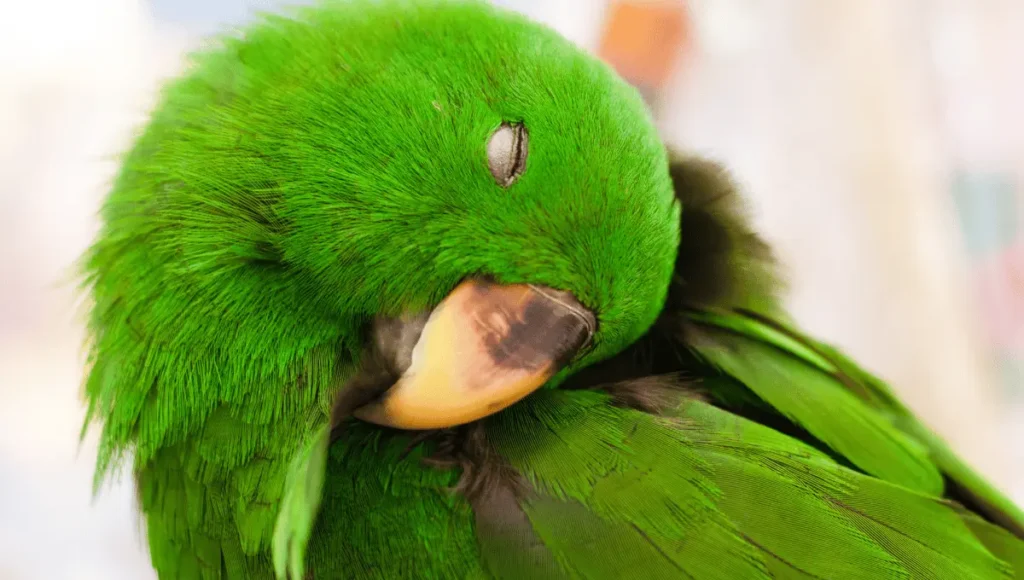
Choosing the Right Cage Location
The location of your parrot’s cage plays a big role in how well they sleep. Parrots need a calm, quiet space to rest. Choose a spot in your home away from noisy appliances, televisions, or high-traffic areas. Avoid placing the cage near windows where outdoor noises or lights might disturb them.
If possible, select a room where you can control the environment and keep it consistent every night. A stable, peaceful location helps your parrot feel secure and ready to sleep.
Lighting and Darkness Requirements
Parrots are highly sensitive to light. Their natural sleep cycle depends on the sunrise and sunset. To ensure they sleep soundly, mimic these natural light patterns in their environment.
Provide Darkness:
Cover the cage with a breathable cover to block out excess light. This gives your parrot a sense of security and signals it’s time to sleep.
Avoid Artificial Lights:
Keep the room dark at night and avoid exposing your parrot to bright screens, lamps, or nightlights.
By controlling the lighting, you’ll help your parrot fall asleep more easily and stay asleep longer.
Temperature and Ventilation
Parrots are comfortable in moderate temperatures, typically between 65°F to 80°F (18°C to 27°C). Extreme cold or heat can disrupt their sleep and even harm their health.
Maintain a Stable Temperature:
Avoid placing the cage near heaters, air conditioners, or drafty windows. Sudden temperature changes can be stressful.
Ensure Good Air Circulation:
Proper ventilation is key to keeping your parrot healthy. However, avoid direct air drafts, as they can make your parrot uncomfortable.
Creating a cozy, stable environment ensures your parrot feels safe and comfortable, setting the stage for restful sleep.
Parrots Sleep
| Step | Description |
| Time to Sleep | Parrots generally sleep 10-12 hours per night, typically starting at dusk and waking at dawn. |
| Sleep Location | Parrots prefer to sleep in a safe, quiet, and dark place. In captivity, they may sleep in their cage or on a perch. Wild parrots sleep in trees or safe spots. |
| Perch Position | Parrots sleep standing on one leg, with the other leg tucked up close to their body. They grip the perch with their toes to stay secure while resting. |
| Head Position | Parrots often tuck their head under a wing when sleeping, which helps keep them warm and secure. |
| Sleep Mode | During sleep, parrots enter a light sleep phase, where they are semi-alert, followed by deeper, restorative sleep. |
| Quiet Environment | Parrots sleep most comfortably in a quiet and dark setting. Minimizing noise and distractions helps them get quality rest. |
| Safety Considerations | Parrots need a safe environment to feel secure. Ensure there are no dangers like drafts, loud noises, or other pets disturbing them. |
Establishing a Consistent Sleep Routine
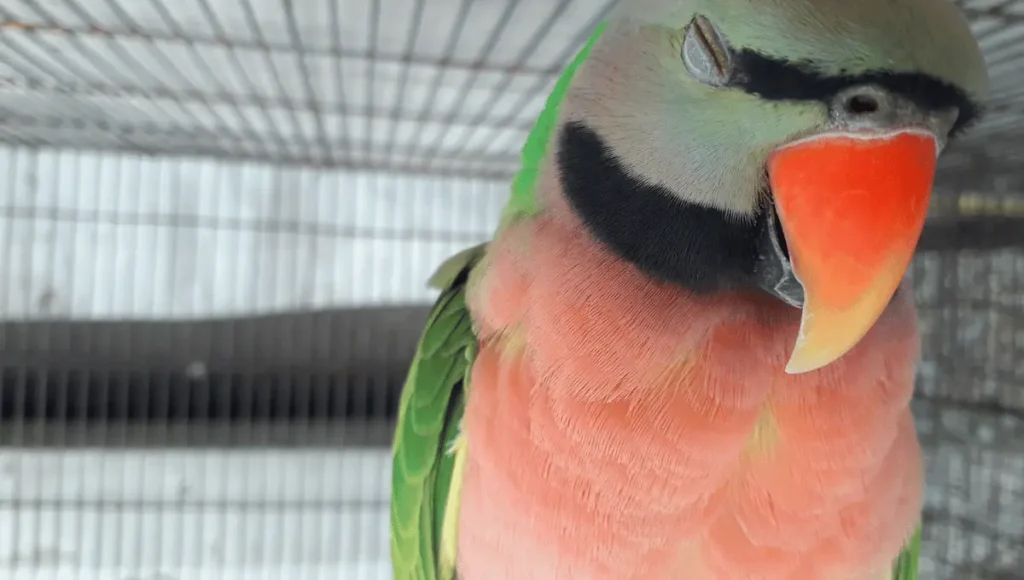
Setting a Regular Sleep Schedule
Parrots thrive on consistency, and having a regular sleep schedule is essential for their health and happiness. In the wild, parrots rest from sunset to sunrise, typically needing 10 to 12 hours of uninterrupted sleep.
Establish a Bedtime:
Set a specific time each evening to prepare your parrot for sleep. Maintain this schedule every day, including weekends.
Wake-Up Time:
Allow your parrot to wake naturally with the morning light, or uncover their cage at the same time each day.
Consistency helps your parrot’s internal clock align with their routine, making it easier for them to fall asleep and stay rested.
Pre-Sleep Activities to Calm Your Parrot
A calming pre-sleep routine helps signal to your parrot that it’s time to wind down. Avoid activities that may overstimulate them close to bedtime. Instead, focus on creating a relaxing atmosphere.
Dim the Lights:
Gradually reduce lighting in the room as bedtime approaches. This replicates the natural shift from day to night.
Quiet Interaction:
Spend some quiet time with your parrot, such as gently talking or offering a light scratch. Avoid loud noises or boisterous play.
Remove Distractions:
Make sure the cage is free of toys or items that might encourage your parrot to stay active instead of resting.
By creating a soothing routine, you’ll make it easier for your parrot to relax and prepare for a good night’s sleep.
Importance of Consistency
Parrots are creatures of habit. Sudden changes to their routine can cause stress and disrupt their sleep patterns. By maintaining a consistent sleep schedule and calming pre-sleep activities, you’ll not only improve their rest but also strengthen their sense of security.
Troubleshooting Common Sleep Problems
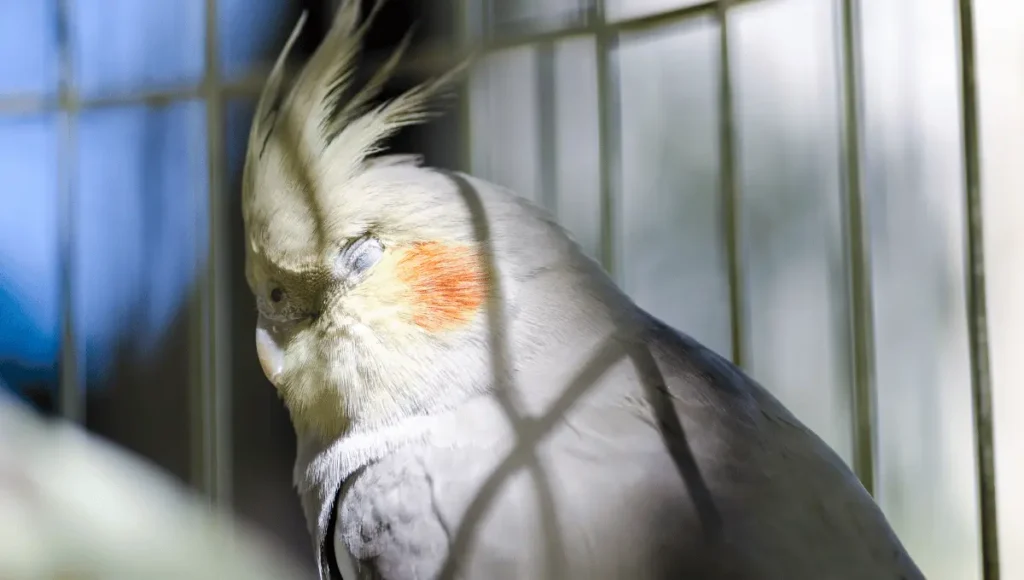
Handling Night Frights
Night frights are sudden episodes where your parrot panics during the night. This can happen due to unexpected noises, sudden movements, or changes in lighting. Night frights can be stressful for your parrot and may even cause injury if they thrash around the cage.
Identify Triggers:
Look for sources of noise or light that might disturb your parrot, such as passing cars, barking dogs, or flickering lights.
Use a Night Light:
A soft, dim night light can help your parrot feel secure and prevent complete darkness, which may sometimes be a trigger.
Reassure Your Parrot:
If a night fright occurs, speak to your parrot in a calm voice to reassure them. Avoid making sudden movements that could escalate their fear.
By minimizing triggers and creating a sense of security, you can help reduce the chances of night frights.
Addressing Noise Sensitivity
Parrots are sensitive to sounds, and excessive noise can disrupt their sleep. Loud appliances, music, or even conversations near their cage might prevent them from resting properly.
Reduce Noise Levels:
Keep your parrot’s sleeping area quiet during the night. If your home is naturally noisy, consider relocating the cage to a more peaceful room.
Use White Noise:
A white noise machine or soft background sound, such as a fan, can help mask disruptive noises and create a calming atmosphere.
Minimizing noise interruptions ensures your parrot can enjoy uninterrupted sleep.
Managing Stress and Anxiety
Stress and anxiety are common causes of sleep problems in parrots. Changes in their environment, lack of routine, or unfamiliar situations can make it difficult for them to relax.
Create a Calm Environment:
Keep their sleeping area consistent and free of sudden changes, such as moving furniture or introducing new pets nearby.
Provide Security:
Covering the cage at night can help your parrot feel safe and shielded from outside distractions.
Avoid Overstimulation:
Too much activity or excitement before bedtime can make it harder for your parrot to settle down.
Understanding and addressing your parrot’s stressors will not only improve their sleep but also enhance their overall well-being.
Conclusion
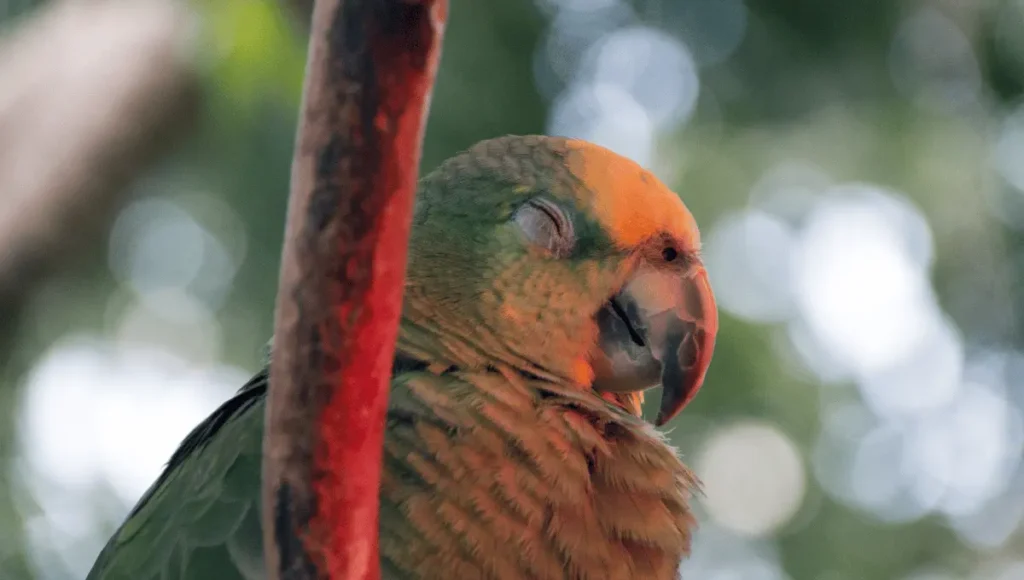
In conclusion, helping your parrot sleep soundly every night is essential for their health and happiness. By providing a calm and comfortable sleep environment, sticking to a regular sleep schedule, and addressing any sleep-related issues, you can ensure your parrot gets the rest they need.
A well-rested parrot is a happier, healthier companion. By following these simple steps, you’ll create a better routine for your parrot, leading to more peaceful nights and brighter days.
FAQs
How many hours should my parrot sleep each night?
Parrots typically need 10 to 12 hours of sleep each night to stay healthy and happy.
Should I cover my parrot’s cage at night?
Yes, covering your parrot’s cage at night can help create a dark, secure environment, signaling it’s time to sleep.
What can I do if my parrot has night frights?
Try to identify any sources of fear, such as sudden noises or bright lights, and minimize them. You can also use a night light to help your parrot feel secure.
Can noise affect my parrot’s sleep?
Yes, parrots are sensitive to noise. Keeping the area around their cage quiet at night will help them sleep better.
How can I help my parrot relax before bedtime?
Create a calming pre-bedtime routine, such as dimming the lights, talking softly to your parrot, and avoiding any excitement or stimulation.
Pingback: How to Be a Parrot Head: A Beginner’s Ultimate Guide
Pingback: How to Keep a Parrot at Home: Essential Tips & Care